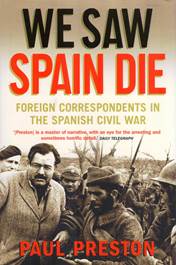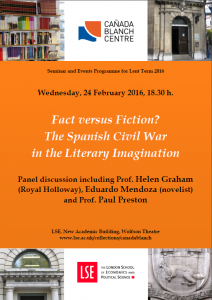We Saw Spain Die: Foreign Correspondents in the Spanish Civil War
Wednesday 2 March 2016
Oxford University – Ciclo Madariaga
Speaker: Prof. Paul Preston
Introduced by: Diego Rubio (Junior Fellow, University of Oxford)
Time: 5:30pm
Place: Summer Common Room, Magdalen College, Oxford, OX1 4AU
Registration: http://goo.gl/forms/LaEZtlHCaa
From 1936 to 1939, the eyes of the world were fixed on the devastating Spanish conflict that drew both professional war correspondents and great writers alike. Despite difficult political, professional and personal circumstances Ernest Hemingway, John Dos Passos, Josephine Herbst, Martha Gellhorn, W. H. Auden, Stephen Spender, Kim Philby, George Orwell, Arthur Koestler, Cyril Connolly, André Malraux, Antoine de Saint Exupéry, and many others wrote eloquently about the horrors they saw at first-hand.
Together, with many great and now largely forgotten journalists, they put their lives on the line. Facing censorship, they fought to expose the complacency with which the decision-makers of the West were appeasing Hitler and Mussolini. Many campaigned for the lifting of non-intervention, revealing the extent to which the Spanish Republic had been betrayed. Based on extensive diary material and personal correspondence, Mainly British and American, but also Russian and French, Paul Preston’s account tells of the courage and skill of these men and women.
. . Category: Archived Events . Tags: Ciclo Madariaga, Diego Rubio, foreign correspondents, Oxford University, Paul Preston, Spain, Spanish Civil War




